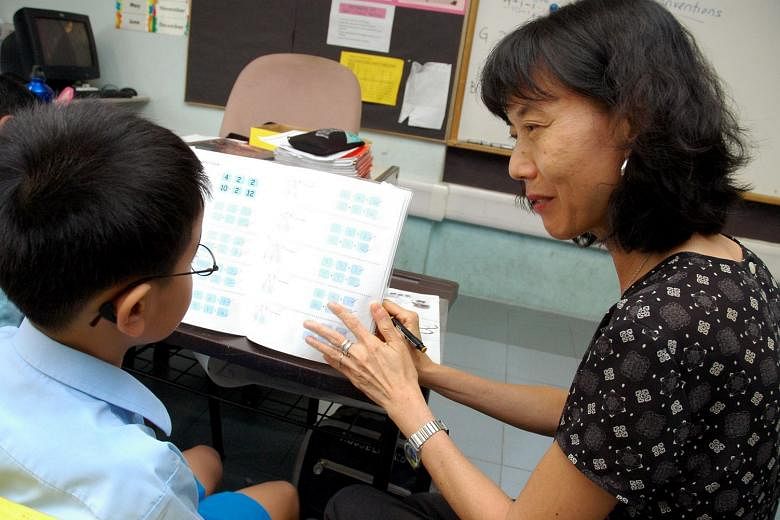SINGAPORE - Parents of children with special needs will receive more guidance at the pre-primary level in choosing suitable schools, as part of recommendations by an advisory panel.
The panel, which had been appointed to make recommendations to the Ministry of Education (MOE) on how compulsory education can be implemented for children with special needs, focused on two main areas: placement and exemption.
The MOE said on Friday (Nov 17) that it has accepted the recommendations, among which was for it to strengthen guidance given to parents before Primary 1, as well as improve public confidence in special education schools and reduce stigmatisation.
Players in the special education sector welcomed the recommendations as well, but noted that there was still scope to improve in some areas, such as attracting more teachers to the sector.
Minister for Education (Schools) Ng Chee Meng had announced in November 2016 that starting from 2019, children with moderate to severe special needs will need to attend publicly-funded schools, just like all other children in Singapore, unless they apply for an exemption.
The Compulsory Education Act passed in 2000 requires all Singaporean children to complete six years of primary education in national schools before they turn 15. Parents can be fined up to $5,000 and/or jailed for up to a year otherwise.
MOE said that it will work towards implementing the recommendations from 2019.
The ministry said it will ensure that Singaporean children with moderate to severe special needs can access learning in a suitable special education school. It will also provide more support for parents at the pre-primary level to choose schools that meet their children's educational needs.
Dr Janil Puthucheary, Minister of State for Education and chairman of the advisory panel, said that the panel kept in mind two key principles: All Singaporean children should be supported in the appropriate educational settings for their needs, and parents have the primary responsibility for ensuring their child attends school.
The panel said that MOE should strengthen existing platforms and processes to support parents in obtaining a diagnosis for their child and making decisions about placement.
It also noted that two groups of children with moderate to severe special needs should still be granted an exemption, even with the implementation of compulsory education. The first group comprise children who are home-schooled, while the second group consist of those deemed unsuitable to attend any national primary schools, including the 20 government-funded special education schools.
To get exemption for homeschooling, parents are to propose an individualised educational plan based on MOE's guidelines, provide a suitable home environment and evidence that they can carry out their plan. They also need to submit annual progress reports and updated plans and be open to home visits if necessary.
For the second group of children who are deemed unsuitable to attend national primary schools, parents need to justify why their child's needs cannot be met in a national primary school and be responsible for making education and/or care arrangements for their child. Parents need to adhere to monitoring processes if their child is receiving an education outside the national school system.
The panel recommended that where there has been evidence that the child's educational interests are not being met in alternative settings, MOE should consider revoking the exemption granted and require him or her to be placed in an appropriate education setting, where possible, or be referred to social support agencies.
The 17-member advisory panel was appointed in November last year by Mr Ng.
Accepting the panel's recommendations, Mr Ng said: "We will continue working closely with community partners for the smooth implementation of compulsory education and ensure the quality, affordability and accessibility of special education."
Those in the special education sector said that more guidance about school options and which settings would suit different children will help parents to make better decisions.
Mr Victor Tay, immediate past president of the Association for Persons with Special Needs, said: "There is a perception among parents that special education schools are not as good. Many parents prefer their child to stay in mainstream schools...but if the child is not suited for that environment, it can break their confidence.
"Quite a few schools experience an influx of pupils at the upper primary level, because either the parents or teachers found that the students can't cope in the mainstream school."
He added that screening is very important. "Hopefully we see a greater pool of students being more accurately played in the correct settings, and have fewer transitions during their school years."
Going forward, Mr Tay added that more can be done to strengthen the pool of special education teachers and improve the accessibility of special education schools so that less well-off families need not travel too far.
Mr Lee Poh Wah, chief executive of philanthropic organisation the Lien Foundation, said that he hopes compulsory education "can create new channels of cooperation between mainstream and special education schools, for instance, in the area of teacher training".
Mainstream schools should also be equipped with more specialised support such as educational pyschologists and occupational therapists, he said.
The full report by the panel can be found here: https://www.moe.gov.sg/docs/default-source/document/education/special-e…

